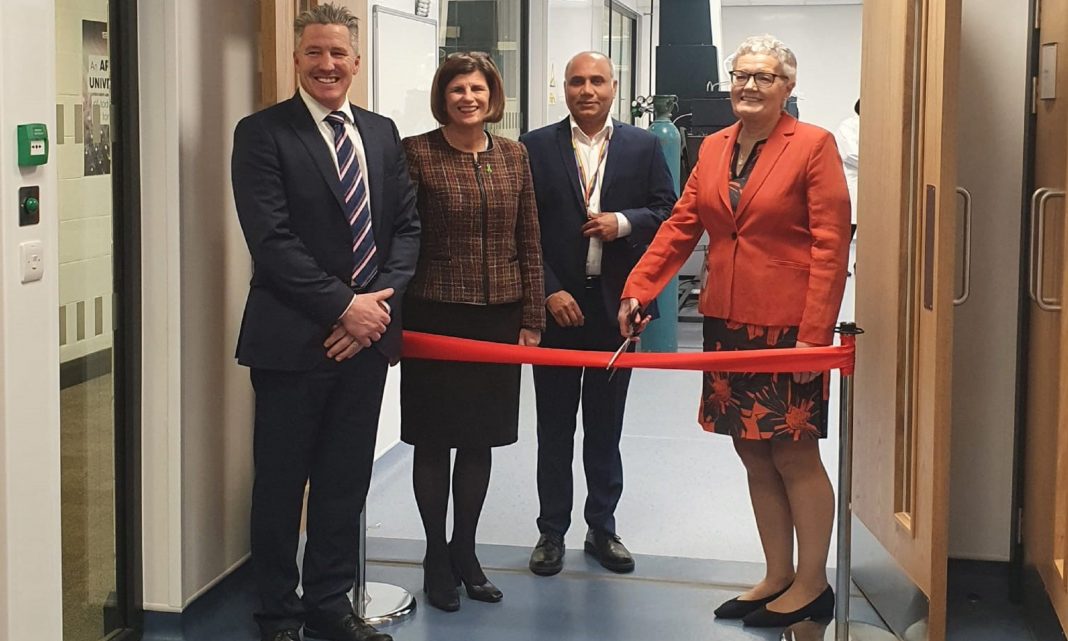A new £1.75 million research and innovation centre designed to revolutionise diet and medication by combining biomedical and data science expertise has opened at the University of Derby.
The Facility for Omics Research in Metabolism (FORM), based at the University’s Kedleston Road site, will focus on personalised foods, vitamins, supplements and medicine, while supporting the education of 800 highly skilled learners and providing more than 20 jobs.
FORM, which is backed by £850,000 from the D2N2 Local Enterprise Partnership via its Local Growth Fund allocation, and matched by the University, was officially opened this week (22 March) to guests from industry, academia and local government.
Professor Kathryn Mitchell CBE DL, Vice-Chancellor and Chief Executive of the University opened the event with a presentation on the University’s research strategy. Professor Chris Bussell, Pro Vice-Chancellor and Dean of the College of Science and Engineering and Professor Gyan Tripathi, Director of FORM at the University, then provided guests insights to the research potential of the Facility, a tour of the world-class laboratory, and introduced them to academics and researchers who will be working in FORM.
The Facility is equipped with Metabolomics and Genomics capabilities and is supported by the University’s Human Sciences Research Centre (HSRC). The aim is to improve the health outcomes of people through a stratified medicine approach for a better understanding of the disease pathologies and agents that can improve metabolic conditions and treat diseases.
The University of Derby is already working on metabolomic research for conditions such as COVID-19, diabetes and obesity. The FORM provides the University with the capability of universal detection of genes (genomics), mRNA (transcriptomics), proteins (proteomics) and metabolites (metabolomics) in biological samples which will help advance understanding of diseases and help identify new and innovative solutions to improve health and prevent and treat diseases.
The technologies within the Facility will also be applied to develop forensic investigation work, boost the performance of elite athletes and support new forms of sustainable agriculture, such as vertical farming.
Professor Chris Bussell said: “This new facility will further the capabilities of D2N2 and will establish cutting edge technologies, innovation and world-class research in the Life Sciences sector within Derby and Derbyshire, further advancing the reputation of the region as a hub for innovation in the understanding and treatment of human diseases.
“FORM will not only provide better scientific understanding and knowledge for meditech and personalised treatments, but it will also create more opportunities for the University to work with companies as part of their own R&D and innovation.”
Professor Warren Manning, Provost for Innovation and Research at the University of Derby, added: “We are delighted to be making another significant development in the University’s research capability with the opening of this centre, which will provide vital data and information for industry and consumers alike, with the long-term aim of improving people’s health outcomes.
“Working in partnership with D2N2, the facility will also deliver new jobs and skills and support the recovery and future prosperity of our city and region.”
Commenting on the new facility, D2N2 chair Elizabeth Fagan, said: “The D2N2 LEP is delighted to have supported the University of Derby’s Facility for OMICSs Research in Metabolism (FORM) with £850,000 from our Local Growth Fund.
“Our region has an excellent reputation for biomedical science and the opening of the new facility will continue to advance our reputation in outstanding research.
“This project is just one of many investments D2N2 LEP has made in partnership with the University of Derby, to boost our economy, improve the lives of local people and shape the future of our region.”
David Campbell, director of Surescreen Diagnostics Ltd, added: “The establishment of the FORM centre is a great achievement for the University of Derby and will be a very valuable asset for businesses, education and the economy across the Midlands. Better research and understanding of the body’s metabolism is crucial to improving patient care and developing the right solutions to improve what is currently available going forward.”



